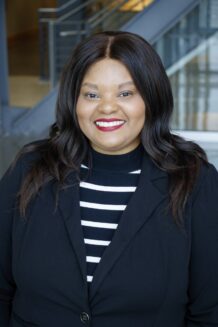Dr. Lovelady is an Assistant Professor in the College of Public Health, Department of Health Behavior and Health Education and a native of the Arkansas Delta. She earned a Bachelor of Science from the University of Arkansas at Pine Bluff, and a Master of Public Health and Doctor of Philosophy in Health Promotion and Prevention Research from the University of Arkansas for Medical Sciences. She completed a T32 NIDA-funded postdoctoral fellowship with the UAMS Translational Training in Addiction Program.
Dr. Lovelady’s primary research interests are centered around investigating health disparities and violence prevention, particularly developing and implementing multi-level public health interventions to improve mental and behavioral health outcomes and reduce gun violence among vulnerable racial-minority populations such as young African American men and their families. This includes exploring linkage interventions that leverage peer support, enhance healthy coping, and improve access to structural/systemic supports to confront persistent post-traumatic stress among African American men in both institutional settings (i.e. hospitals, jails, and prisons) and non-traditional community settings (i.e. barbershops).
Dr. Lovelady’s most recent research highlights barriers and facilitators to implementing a Hospital-based Violence Intervention Program (HVIP) designed to reduce the risk of recurrent injury and enhance recovery from violent assault by connecting patients to necessary mental, behavioral, and social services. With recently awarded funding from the City of Little Rock, a local HVIP will be piloted to examine preliminary intervention and implementation effectiveness. Her KL2 research will further explore the rural expansion of an HVIP to identify factors and strategies for providing HVIP follow-up services for UAMS patients returning to underserved rural Arkansas communities.
Dr. Lovelady has an extensive background in community engaged research dating back to her years with the Arkansas Children’s Hospital Research Institute and UAMS Translational Research Institute. She wholeheartedly believes that community is the essence of public health and key to reducing complex health disparities and achieving health equity. It is her hope to build a robust research program to inform and effect real-world meaningful change among communities with the greatest need.

